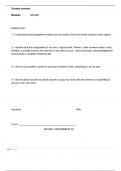Student number:
Module: INC4801
Declare that…
1. I understand what plagiarism entails and am aware of the University’s policy in this regard.
2. I declare that this assignment is my own, original work. Where I used someone else’s work,
whether a printed source, the internet or any other source, I give the proper acknowledgement
and include a complete reference list.
3. I did not use another current or previous student’s work, submitting it as my own.
4. I did not allow and will not allow anyone to copy my work with the intention of submitting it
as his or her own work.
Signature Date:
Score:
INC4801 ASSIGNMENT 02
1|P ag e
, Question 1
1) Rights-based epistemology (Page 11) (2)
Rights-based epistemology to education guides and organizes all elements of learning, from policy
to the classroom, by relying on human rights concepts such as nondiscrimination and equality,
accountability and transparency, participation, empowerment, and the right to education. Education,
according to rights-based epistemology, is a fundamental right for all people, regardless of race,
color, gender, ethnicity, handicap, or socioeconomic status.
2) Inclusive education (2)
According to Bui, Quirk, Almazan, and Valenti (2010); Alquraini and Gut (2012) when all students,
regardless of their challenges, are placed in age-appropriate general education classes in their own
neighborhood schools to receive high-quality instruction, interventions, and supports that enable
them to meet success in the core curriculum, that is referred to as inclusive education.
3) Index of inclusion (2)
It is a resource to support inclusive development of school, it is a comprehensive document that can
help everyone in the school to find their next step in developing their settings, the materials are
designed to build in the wealth of knowledge and experience that people have about their practice.
4) Universal design for learning (2)
Universal design for learning (UDL) is a set of principles for designing curriculum that provides all
individuals with equal opportunities to learn. UDL is designed to serve all learners, regardless of
ability, disability, age, gender, or cultural and linguistic background. UDL provides a blueprint for
designing goals, methods, materials, and assessments to reach all students including those with
diverse needs.
5) Normalization (2)
Normalisation is a principle that aims for people with learning disabilities to experience 'normal
patterns' of everyday life, such as living in normal, ordinary places, and undertake 'normal' day-to-
day activities.
2|P ag e




